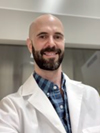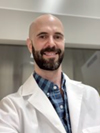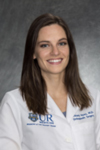News
20212020201920182017
David Fraser launches pilot study with CTSI support
Tuesday, June 29, 2021
 Congratulations to David Fraser, Clinical assistant professor of Dentistry and trainee in the Translational Biomedical Science PhD Program, who has launched a pilot study with support from the University of Rochester Clinical and Translational Science Institute (CTSI).
Congratulations to David Fraser, Clinical assistant professor of Dentistry and trainee in the Translational Biomedical Science PhD Program, who has launched a pilot study with support from the University of Rochester Clinical and Translational Science Institute (CTSI).
David’s project is titled, “Controlled delivery of periodontal ligament cells for in vivo tissue regeneration.”
Nearly 40 percent of U.S. adults are affected by a serious chronic gum disease called periodontitis that can cause irreversible damage to the jaw bone and tooth loss. Currently, costly and unpredictable reconstructive therapies are the only options for treating this bone loss. Therapeutic approaches that uses stem cells to regenerate jaw bone have shown promise, but have run into issues when it comes to delivering the cells to the area of damage.
For his Trainee Pilot study, David Fraser, DDS, will work under the mentorship of Professor Danielle Benoit to develop a special hydrogel scaffold in which the stem cells, called periodontal ligament cells, can be embedded. The pair have already shown that their hydrogel can help these cells differentiate without adding any drugs or growth factors. With UR CTSI funding, they will fine tune the hydrogel so it degrades and releases these cells around teeth to form new bone.
Professor Danielle Benoit awarded NSF Grant
Tuesday, June 1, 2021
Congratulations to Professor Danielle Benoit who was awarded a grant from the National Science Foundation (NSF) Division of Materials Research for her project, “Next-generation PEGylation: antifouling and immunoevasion semi-randomized zwitterionic peptides.” Co-Principal Investigators on this project are Andrew White and Minsoo Kim (URMC Microbiology and Immunology).
This project will explore the use of computationally designed peptides to enhance drug delivery systems, aligning with NSF’s mission ‘To promote the progress of science’ and ‘to advance the national health prosperity, and welfare. Nanoparticles have tremendous potential for delivering new, highly promising therapeutics to specific locations within the body, enhancing drug potency, and reducing side-effects. However, blood proteins adsorb to nanoparticles, resulting in clearance. Protein adsorption reduces the ability of nanoparticles to reach tissue targets organs and tumors. Existing materials to control nanoparticle protein adsorption are limited in number. Furthermore, they are implicated in allergy-like immune system responses after repeated exposures, which has been highlighted recently by the mRNA vaccines for COVID19. This project explores computationally designed peptides with partially randomized sequences to make a new class of diverse anti-protein adsorption options, which, through randomized design, will avoid allergic reactions and other long-term immunological side effects. These materials are expected to be versatile for multiple nanoparticle systems and will enable improved drug delivery. The research activities will be integrated with Rochester’s ongoing K-12 education and outreach efforts, including the “Teach for Teachers” program and graduate/undergraduate researcher mentorship.
Professor Benoit receives University Research Award
Monday, May 31, 2021
Congratulations to Professor Danielle Benoit, who has received a 2021 University Research Award with Professor Anne Meyer, associate professor of biology, and Professor Jin Xiao, associate professor of dentistry, for their project, “Biofilm-on-a-chip: Development of a microphysiological platform to revolutionize treatment paradigms.” University Research Awards (URA) provide “seed” grants for promising, high-risk projects, says Robert Clark, provost and senior vice president for research. The fund has been increased from $500,000 annually to $1 million with half of the funding coming from the President’s Fund, and the rest being matched by the various schools whose faculty members are recipients. Recipients must demonstrate that their projects favor new research with a high probability of being leveraged by future external funding.
Marian Ackun-Farmmer Receives SFB Outstanding Ph.D. Research Award
Wednesday, May 26, 2021
 Fischell Department of Bioengineering (BIOE) postdoctoral researcher Marian Ackun-Farmmer was recently recognized with the Society for Biomaterials (SFB) Outstanding Ph.D. Research Award. SFB is a multidisciplinary society of academic, health care, governmental and business professionals dedicated to promoting advancements in all aspects of biomaterial science, education and professional standards to enhance human health and quality of life.
Fischell Department of Bioengineering (BIOE) postdoctoral researcher Marian Ackun-Farmmer was recently recognized with the Society for Biomaterials (SFB) Outstanding Ph.D. Research Award. SFB is a multidisciplinary society of academic, health care, governmental and business professionals dedicated to promoting advancements in all aspects of biomaterial science, education and professional standards to enhance human health and quality of life.
Ackun-Farmmer was born in Ghana and migrated to the United States at 10 years old. She graduated from George Washington University in Washington, D.C. in 2012 with a B.S. in biomedical engineering. She then joined a three-year rotational employment program at Baxter International. During that time, she rotated in various quality assurance roles at the Mississippi, North Carolina, and Indiana manufacturing facilities. In 2015, Marian joined the lab of Danielle S.W. Benoit at the University of Rochester, where she focused on developing drug delivery systems to improve acute myeloid leukemia treatments. She joined BIOE as a postdoc in Minta Martin Professor of Engineering Chris Jewell’s Immune Engineering Lab in November 2020.
During her Ph.D. research, she gained an appreciation for the interactions between the immune system and biomaterials, which translated to her current multiple sclerosis research in the Jewell Lab. She first became acquainted with SFB and its mission while completing her Ph.D., and traveled to Bordeaux, France for a conference hosted by SFB and its European counterpart in June 2018.
“It was phenomenal,” the BIOE postdoc remembers. “I really love the Society for Biomaterials. The Bordeaux meeting was really small, so it was a great opportunity to network. We got to present work at an international conference, and I met a professor who had authored one of my biomaterials textbooks.” Ackun-Farmmer traveled to Seattle, Wa. for another SFB conference in 2019, and has attended several other meetings which went virtual amidst the COVID-19 pandemic.
Her award winning Ph.D. research submission focused on bone targeting to improve drug delivery efficiency to the bone marrow, where leukemia develops. “Previously, we had developed a peptide sequence with a specific binding affinity to a protein that is deposited by osteoclasts during bone resorption,” the BIOE postdoc explains. “We have previously shown that our peptide-targeted nanoparticle system works really well in fracture healing, particularly in the early stages when, osteoclasts come in and deposit a bunch of this protein. So we researchers can take our nanoparticles and get it to the bone using this approach as a way to improve therapeutic outcomes of drugs that otherwise cannot get to the bone marrow.”
Despite the system’s successes, Ackun-Farmmer noticed a shortcoming; a massive amount of nanoparticles were accumulating in the spleen and the liver, but to treat leukemia, these particles needed to be in the bone.
Ackun-Farmmer and her cohort focused on macrophages, white blood cells which surround and kill microorganisms, remove dead cells, and stimulate the action of other immune system cells. The group used a common liposomal treatment to eliminate macrophages, and observed that a slew of nanoparticles bind to the bone instead of accumulate in the liver.
“We showed this in a naive model, as well as a fracture model,” she says. “And so that was really exciting, because it confirmed that the limiting step to our front lever system was macrophages. It informs next generation designs to try to eliminate macrophage or liver uptake - to essentially avoid macrophages altogether.”
After six months as a BIOE postdoc, Ackun-Farmmer is excited to continue multiple sclerosis research with the Jewell Lab and experience the university’s campus as it transitions back to normal operations post- pandemic. Her sights are set on a career in academia.
David Fraser awarded Joan Wright Goodman Dissertation Fellowship
Tuesday, May 18, 2021
 Congratulations to David Fraser who was awarded a Joan Wright Goodman Dissertation Fellowship for 2021-2022! This fellowship was endowed by Joan Wright Goodman, PhD class of 1952, to support doctoral students across disciplines in the sciences. It is one of the University’s most competitive dissertation fellowships and is given to students who display exceptional ability and promise.
Congratulations to David Fraser who was awarded a Joan Wright Goodman Dissertation Fellowship for 2021-2022! This fellowship was endowed by Joan Wright Goodman, PhD class of 1952, to support doctoral students across disciplines in the sciences. It is one of the University’s most competitive dissertation fellowships and is given to students who display exceptional ability and promise.
Brittany Haws receives funding from OTA
Tuesday, April 6, 2021
 Dr. Brittany Haws, an orthopaedic surgery resident conducting research in the Benoit Lab, has received funding from the Orthopaedic Trauma Association for her proposal titled, “Targeted Delivery of GSK-3β Inhibitor Loaded Nanoparticles for Fracture Healing in a Murine Nonunion Model.”
Dr. Brittany Haws, an orthopaedic surgery resident conducting research in the Benoit Lab, has received funding from the Orthopaedic Trauma Association for her proposal titled, “Targeted Delivery of GSK-3β Inhibitor Loaded Nanoparticles for Fracture Healing in a Murine Nonunion Model.”
Congratulations, Brittany!
First-ever lab model of human eye offers hope for macular degeneration patients
Tuesday, March 30, 2021
Rochester researchers say their breakthrough could lead to patient-specific treatments.
Age-related macular degeneration (AMD), which leads to a loss of central vision, is the most frequent cause of blindness in adults 50 years of age or older, affecting an estimated 196 million people worldwide. There is no cure, though treatment can slow the onset and preserve some vision.
Recently, however, researchers at the University of Rochester have made an important breakthrough in the quest for an AMD cure. Their first three-dimensional (3D) lab model mimics the part of the human retina affected in macular degeneration.
Their model combines stem cell-derived retinal tissue and vascular networks from human patients with bioengineered synthetic materials in a three-dimensional "matrix." Notably, using patient-derived 3D retinal tissue allowed the researchers to investigate the underlying mechanisms involved in advanced neovascular macular degeneration, the wet form of macular degeneration, which is the more debilitating and blinding form of the disease.
The researchers have also demonstrated that wet-AMD-related changes in their human retina model could be targeted with drugs.
"Once we have validated this over a large sample, the next hope would be to develop rational drug therapies and potentially even test the efficacy of a specific drug to work for individual patients," says Ruchira Singh, an associate professor of ophthalmology at the University's Flaum Eye Institute.
The lab of Danielle Benoit, professor of biomedical engineering and director of the Materials Science Program, engineered the synthetic materials for the matrix and helped configure it, as described in a paper in Cell Stem Cell.
Lab model offers hope for macular degeneration patients
Monday, March 29, 2021
Age-related macular degeneration (AMD), which leads to a loss of central vision, is the most frequent cause of blindness in adults 50 years of age or older, affecting an estimated 196 million people worldwide. There is no cure, though treatment can slow the onset and preserve some vision.
Recently, however, researchers at the University of Rochester have made an important breakthrough in the quest for an AMD cure. Their first three-dimensional (3D) lab model mimics the part of the human retina affected in macular degeneration.
Their model combines stem cell-derived retinal tissue and vascular networks from human patients with bioengineered synthetic materials in a three-dimensional "matrix." Notably, using patient-derived 3D retinal tissue allowed the researchers to investigate the underlying mechanisms involved in advanced neovascular macular degeneration, the wet form of macular degeneration, which is the more debilitating and blinding form of the disease.
The researchers have also demonstrated that wet-AMD-related changes in their human retina model could be targeted with drugs.
"Once we have validated this over a large sample, the next hope would be to develop rational drug therapies and potentially even test the efficacy of a specific drug to work for individual patients," says Ruchira Singh, an associate professor of ophthalmology at the University's Flaum Eye Institute.
The lab of Danielle Benoit, professor of biomedical engineering and director of the Materials Science Program, engineered the synthetic materials for the matrix and helped configure it, as described in a paper in Cell Stem Cell.
Benoit Lab students and alums receive NSF GRFP Honorable Mentions
Wednesday, March 24, 2021
Congratulations to Benoit lab Ph.D. student Alyson March, as well as Benoit lab alumni Nathaniel Silva (Northeastern University BME Ph.D. program) and Kharimat Lora Alatise (Clemson University BME Ph.D. program). Nathaniel was selected and Alyson and Lora both received Honorable Mentions from the National Science Foundation’s Graduate Research Fellowship Program. The National Science Foundation (NSF) Graduate Research Fellowship Program (GRFP) is the country’s oldest fellowship program that directly recognizes and supports outstanding graduate students in various STEM disciplines who are pursuing research-based master's and doctoral degrees at accredited United States institutions. The NSF accords Honorable Mention to meritorious applicants who do not receive Fellowship awards. This is considered a significant national academic achievement.
Yiming Li wins ORS New Investigator Recognition Award
Tuesday, February 16, 2021
 Yiming Li, a postdoctoral scholar in the lab of Professor Danielle Benoit, won a New Investigator Recognition Award. Yiming won the award at the Orthopaedic Research Society (ORS) Annual Meeting for her project titled, “Matrix Metalloproteinase (MMP)-degradable Tissue Engineered Periosteum Coordinates Allograft Healing Via Early Stage Recruitment And Support Of Host Neurovasculature.”
Yiming Li, a postdoctoral scholar in the lab of Professor Danielle Benoit, won a New Investigator Recognition Award. Yiming won the award at the Orthopaedic Research Society (ORS) Annual Meeting for her project titled, “Matrix Metalloproteinase (MMP)-degradable Tissue Engineered Periosteum Coordinates Allograft Healing Via Early Stage Recruitment And Support Of Host Neurovasculature.”